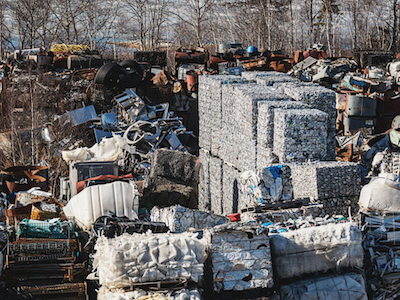Market

June 8, 2017
Ferrous Scrap Prices Sideways to Down $10
Written by John Packard
Ferrous scrap pricing has solidified in most regions of the United States east of the Rocky Mountains. Scrap prices traded sideways (remained the same as last month) on prime grades such as bundles and busheling. Otherwise, shredded and obsolete grades saw declines of $10 to $15 per gross ton, according to Steel Market Update (SMU) sources.
One source in the Ohio Valley reported prime grades moving sideways at $380-$400 per gross ton. Shredded grades were down $10-$15 at $290-$295 per gross ton. Heavy melt scrap (HMS) declined by $10 and plate/structural dipped by $5 per gross ton.
SMU’s Ohio Valley source commented: “The market, in general, was stronger the closer to the coast as export sales through July are sideways, and pricing on the coast reflected this. In the valley, demand reductions from two major consumers resulted in price drops of $5 to $15 per gross ton. Shred is the weakest as this grade is the most prevalent and is the easiest to transport from outside regions. Somewhat surprisingly, primes traded sideways across the nation as the big electric shops competed for bush and bundles. Seems demand for flat roll looks strong for the coming months and prime supply will be reduced with summer shutdowns at the stamping plants. The market looks stable into the summer with the wild card being Section 232 and its potential ramifications.”
Scrap guru Mike Marley of World Steel Dynamics reports that the East Coast mills have made their scrap buys, though some outlier mills like Evraz in Pueblo, Colo., were still negotiating as of Wednesday. He provided the following data and color about negotiations that have just concluded around the country:
“Most have made their deals at this point…. About the only consistent moves were down $10 per gross ton on shredded scrap in most regions. A few mills, like ArcelorMittal in Cleveland, pushed for a $15-per-ton cut in shredded and got it. But shredded prices there were at $310 per ton delivered to the mill last month, the highest in the country. That shredded price is now at $295. That’s still above the $275-280 per ton range in other regional markets this month. Shredded prices in Cleveland now match what is being paid for five-foot plate and structural scrap there this month. It’s off by $10 per ton and so is No. 1 Heavy Melt, which is now at $270 per ton. These likewise are above prices being paid in other regions.
“The bundles and busheling prices in northern Ohio are higher, as well, but are unchanged at $390 per ton. ArcelorMittal, however, is not buying any industrial scrap. Other mills in the region are and are paying that price. That is probably the widest busheling/shredded disparity in the U.S., a whopping $95 per ton. I don’t think we’ve seen that kind of spread since the crazy days of 2008-09 when busheling soared to more than $800 per ton and shredded was at about $550.
“Mills in the South were as low as $350-355 per ton on bush and bundles in May and managed to beat the price down by another $10 per ton this month. The EAF flat-rolled producers there have told local suppliers they have plenty of imported prime scrap and don’t need much from them or the dealers in Detroit. They could be blowing smoke, but no one is sure. So, most dealers figured they would unload what they can this month and see what July brings in terms of demand for tons and prices. The price cuts put industrial scrap in the $340-350 per ton range in the South. There could be one or two mills lower. In the North and Midwest, on the other hand, bundles and busheling prices were unchanged in major steelmaking cities like Detroit, Chicago, Pittsburgh and Cleveland.
“The variants were five-foot plate, structural scrap and No. 1 Heavy Melt. These were unchanged in Detroit and the East, but down by between $5 and $10 per ton in Chicago, Cleveland, Pittsburgh and Detroit. In the South, these grades were off by $10 per ton. Pretty much all the ferrous prices in the South were off by $10 per ton.
“There was one bulk cargo sold to Turkey this week from the U.S. East Coast. The price for the 80/20 heavy melt was $274 per metric ton, up $3 per ton from a deal done a week ago. U.S. exporters lately have been selling only one or two cargoes a week to the Turkish mills.”
One of SMU’s East Coast sources advised us: “My sense of sellers’ sentiment in June is that despite continued decent scrap demand nationwide, dealers have been seeing flat roll prices creep lower recently, iron ore and crude trade markedly lower over the past 60 days, few export sales, and some expected seasonal mill slowdowns this summer. Accordingly, dealers offered plenty of shredded scrap to mills, including tonnage they do not own currently but think they will be able to buy this month. They do not want to be caught with unsold inventory if the market does trade lower in the coming months. I do not necessarily think it will trade lower in July, but the potential is there for it to do so.
“At the same time, dealers were unable to offer much prime scrap because they do not own it and they are not going to procure it to ship to mills over the next month or two. Accordingly, the prime premium to shred remains unusually wide—anywhere from $60-$100 per gross ton—and I expect that to continue for the foreseeable future.”
The post Ferrous Scrap Prices Sideways to Down $10 appeared first on Steel Market Update.






